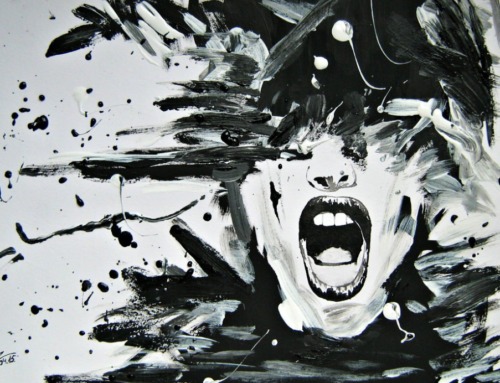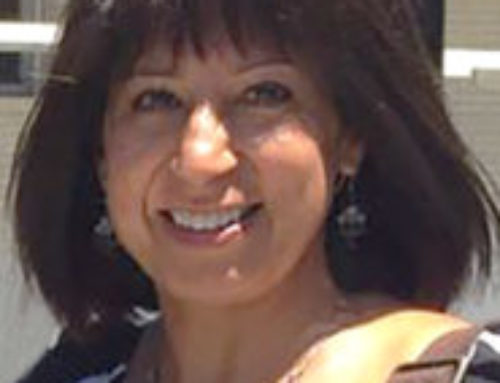My Mother Wanders
April 27, 2019
By Jane Paul
My mother wanders through the creaky old house, not on cat feet like her favorite poem but on the squeaky wavering wheels of an elderly person’s ubiquitous symbol of limited mobility – the walker. Querulously negotiating turns that were not even noticed five or ten years ago, taking ten minutes to launch from sitting to standing, and back down again, from fragile weight on the walker to the comfy position in the one wonderful old big chair.
The chair is the central point of the living room, where books are read, puzzles tackled, where memories of a conflicted and emotionally embattled husband & father live. And somehow it becomes the center of the house, via matriarch and patriarch memorialized, our collective memories of their lives and their struggles, and central to the ever emerging signs of aging – in stages of participation and observance and denial, from the chair.
The house itself is gracious but disabled, like her. Maintaining a fairly strong form, a tidy and well-composed design, but fraying ferociously at the edges.
I visit and water wilting plants, sweep massive leaf build up, and look at the peeling paint, thinking, I cannot do a damn thing about that. All I can do is make a meal, provide companionship, tell glowing grandchild tales, and try in 48 hours to fill in the gap of 3,000 long, sad and motherless miles.
She’s 92 and the house is older. Together they have seen the war to end all wars and then another. Seen fine heroes and enigmatic presidents and villains of the worst sort come and go, rule, thrive and be assassinated. Listened to ragtime, to big band and to the folkies of the 60’s.
When the roof caves, will she suddenly falter? When the plumbing collapses, will she fall and not get up? Old, strong, fragile, irritating, valuable, sweet and decaying – all at the same time – the built edifice and the real life flesh and blood arthritic parent move steeply each day down the path of age. While we, the inheritors, wonder how to manage our legacy, our love and our burden.
How do I manage both my necessary absences and the trying visits – forced into the modern day separation of generations and miles, struggling with the decline of respect and relevance of our elders? How to bring love and sensibility, a shred of dignity and necessary regimen? How do I go away each time with a wrenched heart, silently weeping in the taxi to JFK airport, desperate for the normality of my own children, my computer screen, and my west coast life – while struggling to cope with the fact that any trip may be the last?
The house and its voices, the prospects of being sold, torn down, silenced, belongings, the big chair; given away or sold to strangers – family history as the backbone of who we are – the prospects of a family undone are now more pungent, bitter, and imminent with the passing of time.
Still the luminous evening light across the window view is a particular, spectacular and rarely acclaimed phenomenon in this corner of Brooklyn, reminding us of days and nights in exquisite childhood ignorance, ignorant of the investment needed to live by the sea. Husband and wife worked tirelessly to give us this privilege, and we cannot now take the house and familiarity from her.
The Atlantic air sweeps away the mustiness with a step outdoors, as my mother experiences the natural world less with each day, of faltering steps and precarious balance. Music memories, her humming Harry Belafonte songs, mix with the foghorns and car alarms of our Brooklyn seashore.
Unwilling to accept age’s disabilities and limitations, creeping senility causes understanding and adaptability to disappear. Time eats at the functions of the smart woman and at the memories of the house – of a thousand dinners of traded peas and teenage jibes, of silly dances across the living room, of unconscious folk music propaganda and at the rare acknowledgment of fatherly approval – all enabled by a mother’s care and love and concern via home-made cookies and tenacious consistency.
But criticism also comes unedited now; ninety years of repressed emotional truth erupts in unfiltered moments, and a grievous lack of self-esteem. Emerging from the shadows, spilling into words unleashed by a husband’s death and hardening of the arteries, comes a childhood crisscrossed by stern Edwardian parenting, Victorian mores, European racism, and the bohemian birth of America’s 20th century social justice movement.
More immobile in body and mind, more ragged upholstery where once was dignity and elegance. Just as once lovely rooms now are furnished with walkers, commodes, canes and wheelchairs, her passage to old age has little grace. Yes, we are the “sandwich generation” but haven’t all generations dealt with children and elders, with newborns and with the ill, with the questions, joys and grief of the passing of time? If so, I long for the wisdom of the tribes, of the villages, of the families, of the mothers and of the daughters, like me – tools to cope calmly and compassionately.
Into the one wonderful old armchair I now fall with some exhaustion, yet another cross- country flight has brought me to the old house and the important seat in the living room – she can no longer use it. It’s for me now, this chair – and this role of mother, built by memories, aspirations, life lessons, folk music, obligations and unconditional love – as that creaky squeaky walker tumbles over in final silence.



Social Contact